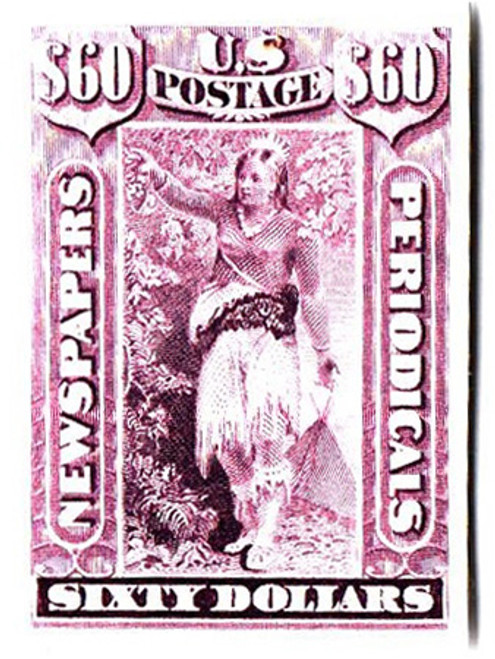
# PR32 - 1875 $60 Newspaper & Periodical Stamp - violet
Scarce Newspaper and Periodical Stamps
Own Some of America’s Greatest Stamp Rarities!
Newspaper and Periodical stamps were only in use between 1865 and 1898. Today these stamps from the past are not widely collected because they are so difficult to find. In fact we have a hard time finding enough stamps for our collectors because they were not sold to the public, but to publishers. Attached to bundles, most of the stamps were thrown away with the periodical’s wrappings – making them among America’s rarest stamps.
Because the Newspaper and Periodical stamps were issued for use on bulk packages of newspapers and periodicals, the first stamps were especially large and colorful, so they could be spotted easily by postal workers.
Elaborate designs prevented forgery and made them some of the most beautiful stamps ever issued. Many of the stamps feature full-length females with names like Freedom, Justice and Peace – references to the benefits of democracy. The figures are important symbols, as Congress felt newspapers and periodicals were important for an informed public, making a stronger democracy.
Newspaper and Periodical stamps replaced a cash system. At one point it was estimated that only one third of the money collected by postal employees was turned in. The stamps were an accounting system which kept employees honest and helped the Post Office Department profit.
In 1869, use of Newspaper and Periodical stamps ceased. Five years later, Congress authorized the usage of the stamps again, after reports from the Postmaster General that nearly two thirds of the postage collected for these publications was never turned in. A new rate was put into effect – 2¢ per pound for weekly issues, and 3¢ per pound for publications delivered less than once a week. The new stamps were also affixed to Post Office books rather than the bundles themselves, so the stamps were much smaller.
Scarce Newspaper and Periodical Stamps
Own Some of America’s Greatest Stamp Rarities!
Newspaper and Periodical stamps were only in use between 1865 and 1898. Today these stamps from the past are not widely collected because they are so difficult to find. In fact we have a hard time finding enough stamps for our collectors because they were not sold to the public, but to publishers. Attached to bundles, most of the stamps were thrown away with the periodical’s wrappings – making them among America’s rarest stamps.
Because the Newspaper and Periodical stamps were issued for use on bulk packages of newspapers and periodicals, the first stamps were especially large and colorful, so they could be spotted easily by postal workers.
Elaborate designs prevented forgery and made them some of the most beautiful stamps ever issued. Many of the stamps feature full-length females with names like Freedom, Justice and Peace – references to the benefits of democracy. The figures are important symbols, as Congress felt newspapers and periodicals were important for an informed public, making a stronger democracy.
Newspaper and Periodical stamps replaced a cash system. At one point it was estimated that only one third of the money collected by postal employees was turned in. The stamps were an accounting system which kept employees honest and helped the Post Office Department profit.
In 1869, use of Newspaper and Periodical stamps ceased. Five years later, Congress authorized the usage of the stamps again, after reports from the Postmaster General that nearly two thirds of the postage collected for these publications was never turned in. A new rate was put into effect – 2¢ per pound for weekly issues, and 3¢ per pound for publications delivered less than once a week. The new stamps were also affixed to Post Office books rather than the bundles themselves, so the stamps were much smaller.











